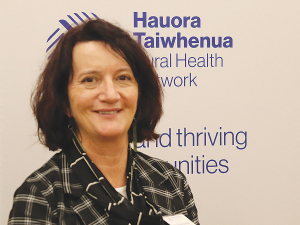M.I.A.
OPINION: The previous government spent too much during the Covid-19 pandemic, despite warnings from officials, according to a briefing released by the Treasury.
 Rural Health Network chair Dr Fiona Bolden says Paxlovid is a complex medication that can cause side effects, which need explanation and management.
Rural Health Network chair Dr Fiona Bolden says Paxlovid is a complex medication that can cause side effects, which need explanation and management.
The Hauora Taiwhenua Rural Health Network is welcoming a government announcement to widen the prescription criteria for the Covid-19 antiviral medication Paxlovid.
In a recent press release, network chair Dr Fiona Bolden said that it was an important step forward as New Zealand comes into the next surge of Covid-19, including the emergence of subvariant BA.5.
In rural areas, many people have antiviral medications like Paxlovid prescribed from many kilometres away and then couriered from urban pharmacies, which tend to be better supplied. However, the distances and individual pharmacies' policies involved can cause delays.
Bolden says the decision to allow community pharmacists to supply this medication without a prescription has raised some serious questions regarding patient safety. This concern relates to "back pocket" prescriptions - prescriptions which do not need to be used immediately.
She adds that Paxlovid is a complex medication, with many interactions, and can't be used without a person having adequate kidney or liver function. It can cause side effects, which need explanation and management and for Paxlovid to be safely supplied, access to this information is a necessity.
Bolden claims this information is currently not available in a universal way across the country.
"Pharmacists are an essential part of our rural healthcare team who have already had a very positive role in helping with the care of Covid in the community," she explains.
"Supplying this medication without adequate training and proper support will place additional unnecessary pressure on them. Rural pharmacies shouldn't be prescribing Paxlovid at all, but some rural pharmacists who have had appropriate training, and up-to-date medical records of the patient and the means to provide feedback to the main prescriber, may be able to do so."
Bolden adds that clinical assessment is always going to be an essential part of managing illnesses no matter where people live.
"Outcomes to changes in care need to be monitored carefully for unintended consequences."
Voting has started for the renewal of DairyNZ's milksolids levy.
The most successful catchment groups in NZ are those that have 'a source to sea' approach.
Associate Agriculture Minister and Manawatu dairy farmer Andrew Hoggard says the free trade agreement (FTA) negotiated with India is not a bad deal and his party, Act, will support it when it goes before Parliament.
Newly released data from Environment Canterbury (ECan) Farm Environment Plan (FEP) audits are showing a dramatic lift in environmental performance across the region.
A solid recovery of global dairy prices this year makes a $9.50/kgMS milk price almost a shoo-in for this season.
As New Zealand marks the United Nations’ International Year of the Woman Farmer 2026 (IYWF 2026), industry leaders are challenging the misconception that women only support farming.

OPINION: Here w go: the election date is set for November 7 and the politicians are out of the gate…
OPINION: ECan data was released a few days ago showing Canterbury farmers have made “giant strides on environmental performance”.